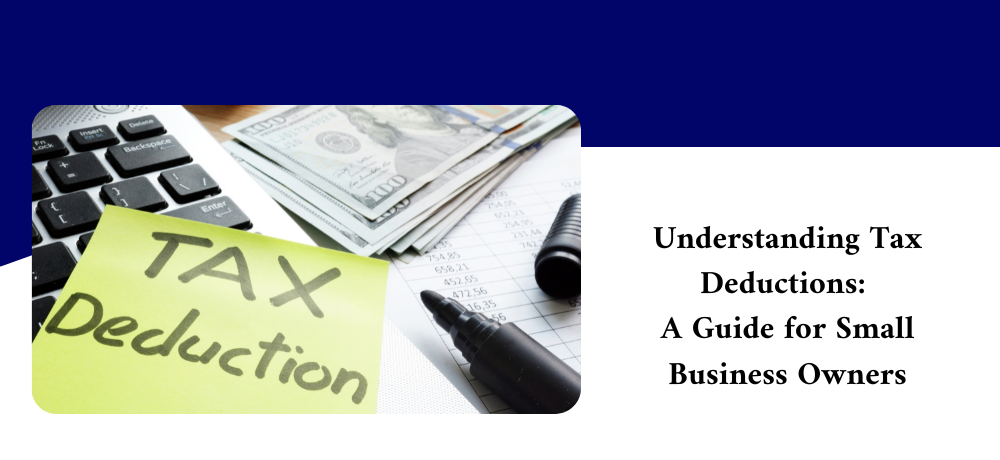Understanding Tax Deductions: A Guide for Small Business Owners

Small business owners often wear multiple hats, from managing day-to-day operations to handling finances. When it comes to finances, understanding tax deductions is crucial. Tax deductions can help you reduce your taxable income, ultimately saving you money. In this comprehensive guide, we'll delve into the world of tax deductions for small businesses, providing you with valuable insights to help you maximize your deductions and minimize your tax liability.
The Importance of Tax Deductions for Small Businesses
Why Tax Deductions Matter
Tax deductions are essential for small business owners because they can significantly impact your bottom line. By reducing your taxable income, you'll have more funds available to reinvest in your business, hire employees, or expand your operations. It's essential to know which deductions apply to your specific business to make the most of them.
Types of Tax Deductions
Tax deductions for small businesses come in various forms. Understanding these deductions and their eligibility criteria is vital. Common types of deductions include business expenses, depreciation, and deductions for self-employed individuals. Let's explore these in detail.
Business Expenses
Business expenses are everyday costs associated with running your business. This category includes rent, utilities, office supplies, and salaries. Keep detailed records of these expenses to claim deductions effectively.
Depreciation Deductions
Depreciation allows you to deduct the cost of assets (such as equipment or vehicles) over their useful life. This deduction helps spread out the expense over several years, reducing your taxable income annually.
Deductions for Self-Employed Individuals
If you're a sole proprietor or a freelancer, you can deduct expenses related to your business, such as home office expenses, travel costs, and health insurance premiums.
Maximizing Tax Deductions for Small Businesses
Keeping Accurate Records
The foundation of maximizing tax deductions is maintaining accurate and organized financial records. This includes receipts, invoices, bank statements, and any other documents related to your business expenses. Using accounting software or hiring a professional bookkeeper can help streamline this process.
Understanding Eligibility
To make the most of tax deductions, it's crucial to understand which deductions your business qualifies for. Consult with a tax professional or use tax preparation software to ensure you're not missing out on any potential deductions.
Leveraging Deductions for Startups
Startups often have unique opportunities for tax deductions. Research and take advantage of tax incentives for new businesses, which can include deductions for research and development expenses, hiring veterans, or investing in low-income communities.
Common Small Business Tax Deductions
Home Office Deduction
If you operate your business from a home office, you may be eligible for the home office deduction. This deduction can include a portion of your rent or mortgage, utilities, and other expenses related to your home office.
Vehicle Expenses
If you use a vehicle for business purposes, you can deduct expenses like mileage, fuel, maintenance, and insurance. Keep a mileage log to track your business-related trips accurately.
Employee Benefits
Offering employee benefits like health insurance, retirement plans, and education assistance can provide tax benefits for your business. These expenses are often deductible, and they can also attract and retain top talent.
Small Business Tax Deductions: Compliance and Documentation
Staying Compliant
To ensure you're in compliance with tax laws, it's crucial to stay up-to-date with the latest regulations. Tax codes can change, so consider consulting with a tax professional or using tax software to remain compliant.
Documenting Deductions
Proper documentation is key when claiming deductions. Ensure that you have receipts, invoices, and records to substantiate your deductions in case of an audit. Digital record-keeping can make this process more efficient.
Record Retention
The IRS typically requires businesses to retain financial records for at least three years. Some records, such as those related to property or investments, may need to be kept longer. Develop a record retention strategy to stay organized and compliant.
Seek Professional Guidance
Benefits of Hiring a Tax Professional
Navigating the complexities of tax deductions can be daunting for small business owners. Hiring a tax professional or certified public accountant (CPA) can provide peace of mind, as they have the expertise to maximize your deductions while ensuring compliance.
Utilize Tax Preparation Software
If you prefer a DIY approach, consider using tax preparation software designed for small businesses. These tools guide you through the deduction process, helping you identify and claim eligible expenses.
Understanding tax deductions is vital for small business owners looking to optimize their financial health. By comprehending the types of deductions available, keeping accurate records, maximizing eligible deductions, and staying compliant, you can potentially save your business substantial amounts of money. Whether you choose to seek professional guidance or utilize tax software, taking a proactive approach to deductions will benefit both your bottom line and the long-term success of your small business.
For expert assistance with your tax preparation, bookkeeping, and payroll needs, contact Pinnacle 1 – Goose Creek. We've been serving clients locally and nationwide for over 20 years, making life easier for individuals and business owners alike.
Get in touch with us today
To learn more about what we do, please click here. To contact us, please click here or call us at (843) 797-5185.